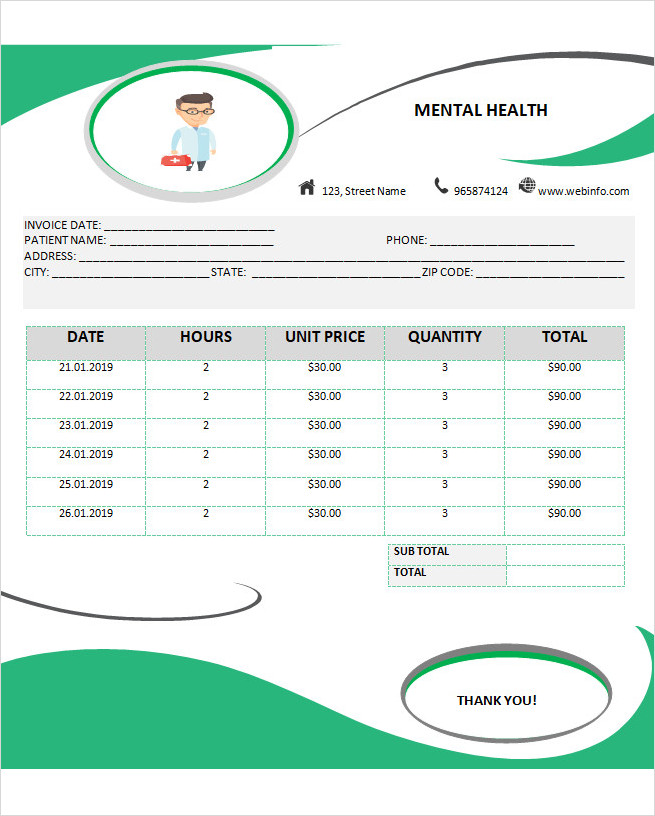
As a mental health professional, one of the crucial aspects of your practice is ensuring that you are properly compensated for your services. This is where a mental health invoice comes into play.
A mental health invoice is a document that allows you to bill your clients for the services you have provided.
This article will explore what a mental health invoice is, why it is important, how to create one, and provide some tips for successful invoicing. Whether you are a therapist, counselor, psychologist, or psychiatrist, understanding the ins and outs of a mental health invoice is essential for the smooth operation of your practice.
What is a Mental Health Invoice?
A mental health invoice is a document that outlines the services provided by a mental health professional and the corresponding charges for those services. It serves as a formal request for payment from the client or their insurance company. The invoice typically includes details such as the provider’s name and contact information, the client’s name and contact information, a description of the services rendered, the date of service, the charge for each service, and the total amount due.
Having a mental health invoice is crucial for maintaining accurate financial records and ensuring that you are properly compensated for your work. It also serves as a legal document in case of any billing disputes or audits.
Why is a Mental Health Invoice Important?
A mental health invoice is important for several reasons:
- Professionalism: Providing a detailed invoice demonstrates your professionalism as a mental health practitioner. It shows that you value transparency and clear communication with your clients.
- Financial Organization: Invoices help you keep track of your earnings and expenses, making it easier to manage your finances and file taxes.
- Insurance Reimbursement: If you accept insurance payments, a well-documented invoice is essential for submitting claims and receiving reimbursement.
- Billing Accuracy: Invoices ensure that you are billing accurately and consistently for your services, minimizing errors and potential payment delays.
- Legal Protection: In the event of a billing dispute or audit, having a detailed invoice can provide legal protection and support your case.
How to Create a Mental Health Invoice
Creating a mental health invoice is a straightforward process. Here are the steps to follow:
- Gather Provider and Client Information: Collect all the necessary information, including your name, address, phone number, email, and license number. Also, gather the client’s name, address, phone number, and email.
- Include a Unique Invoice Number: Assign a unique number to each invoice for easy tracking and reference.
- Specify the Date of Service: Clearly state the date or dates on which the services were provided.
- Describe the Services: Provide a detailed description of the services rendered, including the length of the session, type of therapy, or any additional interventions.
- Itemize Charges: Break down the charges for each service provided. Include the hourly rate, session duration, and any additional fees such as assessments or paperwork.
- Calculate the Total Amount Due: Sum up the charges to calculate the total amount due.
- Include Payment Terms and Methods: Clearly state your payment terms, including payment due date, accepted payment methods, and any late payment penalties.
- Add Your Contact Information: Include your contact information again at the bottom of the invoice for easy reference.
- Review and Send: Double-check the invoice for accuracy and completeness before sending it to your client.
Using invoicing software or templates designed for mental health professionals can simplify the process and ensure that you include all the necessary information.
Example and Sample of a Mental Health Invoice
Here are some examples of a mental health invoice:







Tips for Successful Invoicing in Mental Health Practice
Here are some tips to ensure successful invoicing in your mental health practice:
- Consistency: Develop a standardized format for your invoices and use it consistently for all clients.
- Timeliness: Send invoices promptly after providing the services to avoid payment delays.
- Clear Communication: Communicate your payment terms and expectations to clients upfront to avoid misunderstandings.
- Automate Invoicing: Consider using invoicing software or templates to automate the process and save time.
- Keep Records: Maintain organized records of all invoices, payments, and related documentation for future reference.
- Follow-Up: If a client has not paid within the specified timeframe, send a friendly reminder and follow up accordingly.
- Stay Professional: Maintain a professional and courteous approach when discussing payments with clients.
- Seek Professional Help: If managing invoices becomes overwhelming, consider hiring a bookkeeper or accountant to assist you.
By implementing these tips, you can streamline your invoicing process and ensure that you are promptly and accurately compensated for your mental health services.
Free Mental Health Invoice Template!
A mental health invoice is an essential tool for mental health professionals to ensure proper billing and payment for their services. By understanding what a mental health invoice is, why it is important, and how to create one, you can maintain professionalism, financial organization, and legal protection in your practice.
By following the provided tips for successful invoicing, you can optimize your invoicing process and focus on providing the best possible care to your clients.
Mental Health Invoice Template Word – Download